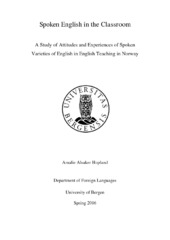| dc.description.abstract | To be able to express oneself orally is one of the five basic skills that is considered necessary for learning and development in school, work, and in society, and therefore deserves attention. The English language has developed from mainly being a language belonging to the native speakers to becoming a world language. Today, speakers of English use the language mainly to communicate internationally. With this development, the native speaker norm has been questioned by many academics. This is a highly relevant topic because the current curriculum in Norway, the National Curriculum of Knowledge Promotion, has since 2006 focused on intercultural competence and global English. This master thesis investigates teachers' and students' views and experiences of spoken English varieties, the native speaker norm, and suggested theories and approaches to language teaching. It also considers how the teachers and students views correlate. A mixed methods approach has been applied in order to answer the research questions. The data material is gathered through four interviews of teachers of the subject International English at VG2. Additionally, 62 students in the teachers' classes have answered an online questionnaire regarding views, thoughts and experiences concerning spoken varieties of English. The results show that the students find communication and intelligibility the key components of language learning. However, the students find native English varieties the most appropriate to use for Norwegians, the most preferred accents, the accents given the most positive characteristics, and the accents that are chosen as target aims by the students. A non-native variety of English such as Norwegian English is viewed as not sufficient. The students also suggest having beliefs about the teacher expecting them to speak native-like English which indicates a belief of a native English teaching norm in class. The teachers in the interview reject this claim, although suggesting encouraging native-like fluency for the students who desire it and using native varieties of English as a reference but not a norm in their teaching. | en_US |
